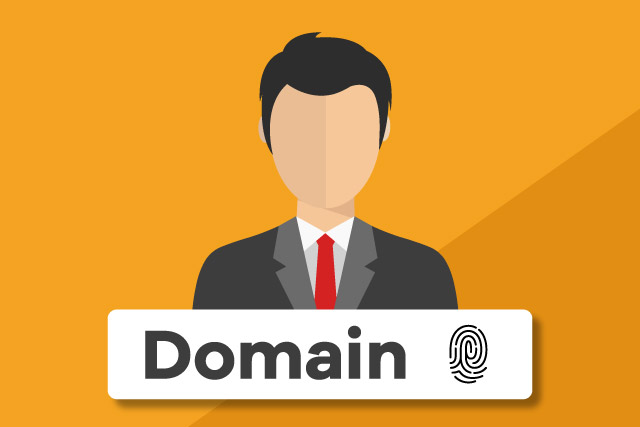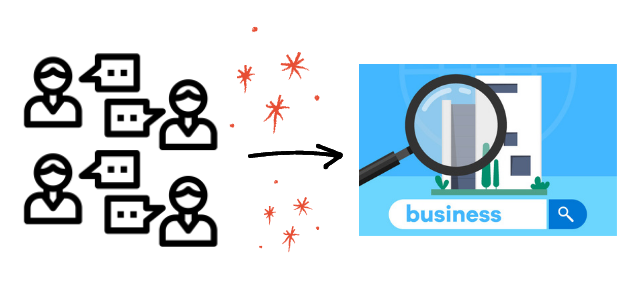Brandable domain vs descriptive domain and what are they?
There has been always a great debate over a brandable domain vs a descriptive domain, and which type is the best for a business. This is expected because when one registers a domain name, securing the ideal domain name has always been a challenge. Each type of domain has its merits and there is no right answer to it. It is because a domain name is more than just a string of words. Rather, it is a business’s digital identity and address in the vast Internet landscape.

A domain is more than just a string of words. It is a business’s online identity!
Gone are the days when people discover your business through word-of-mouth. In fact, people now discover new businesses by searching online, and the domain name plays a huge role in this. It is a crucial part for how people identify a business online.

Business discovery has moved from word-of-mouth to searching online.
There are two types of domain name, namely a descriptive one and a brandable one.

Some examples of a descriptive domain name.
Descriptive domain name
A descriptive domain name informs the audience clearly and specifically on what a business does, the services it offers or the type of contents on its website.
Example: tennis.com, digitalmarketer.com, wine.com, runningshoes.com, etc.

Some of the most famous brandable domains.
Brandable domain name
On the other hand, a brandable domain name does not include any description or keywords to inform the audience exactly what it is about. It is more of a made-up word, a wordplay, or a re-creation of existing words, making it creative and unique, and hence its potential for branding. This type of domain is usually aimed to evoke certain emotions or feelings from the audience on the get-go.
Example: spotify.com, zapier.com, lego.com, airbnb.com, etc.

Take a look at all the pros and cons of both types of domain name.
The advantages of using a descriptive domain name
One of the advantages of a descriptive domain name is that it is straightforward and direct. This type of domain is usually pretty much self-explanatory, in which the audience can immediately grasp the idea of what the website is going to be about. Website owners need not spend extra time and effort to educate their audience about what their websites are about.
Another advantage of a descriptive domain name is it usually contains keywords. It is keyword-friendly and most people search these keywords to find what they need. Websites using descriptive domain name might enjoy a slight advantage in the search engine ranking results. However, effort is still required on the website owner’s end to improve SEO.
Last but not least, a descriptive domain name is easy to remember for users. It tends to use words that users already know and can easily recall. Users find it easy to comprehend and a lot easier to find you. The domain name could be directly the solution the audience is looking for.
The disadvantages of a descriptive domain name
A descriptive domain name also comes with its disadvantages. One of them is that it is less effective in creating an emotional impact for the audience. Although it is powerful in telling the audience what a company does, but it lacks in building the personality of a brand. It is difficult to build an identity around it, as it does not really tell people anything. Most of the time, it is boring and does not stand out. For example, you are more likely to remember Adidas, rather than athleticshoes.com.
Another disadvantage is that a descriptive domain name might become a limitation for a business in expanding their product range or services. What a business does or sell now does not mean it will be the same five years down the road. Businesses change over time, and a descriptive name that is too descriptive does not help at all. Imagine if Amazon started with booksforsale.com.
In addition, a descriptive domain name does not stand out. The terms and phrases used in it have probably been used by countless other businesses. A business will not be able to differentiate itself if there are many others using the same general terms. For example, there may be many other John’s Bakeries operating at the same time in a country. The audience will find it much more difficult to identify a certain John’s Bakeries, and they might end up in another wrong John’s Bakeries.
Last but not least, a descriptive domain name is harder to trademark, as the words in it are generic and used by many people on a daily basis. These words are not allowed to be trademarked, leaving the identity of a business that is using them vulnerable. Any businesses or anyone can just easily swoop in and take over the identity. Without a trademark, malicious players can also easily impersonate websites that use a descriptive domain name to do harm.
We have talked a lot about a descriptive domain name, now let’s talk about a brandable domain name.
The advantages of using a brandable domain name
One of the advantages of a brandable domain name is that it is unique and memorable, which helps a business to stand out more and set itself apart from the crowd. As mentioned above, it is creative and unique, with potential for branding, because the registrants can use made-up word, clever wordplay, or recreate existing words. The audience tends to remember creative words like these, rather than generic terms and words. For example, people are more likely to recognise Lego, rather than toybricks.com.
Another advantage of a brandable domain name is that it is more powerful in evoking certain emotions in people. It is far more suitable for businesses to build their identity around it, compared to generic terms and phrases in a descriptive domain name. Businesses nowadays are building a relationship with their customers, rather than just describing what they do or what they sell. This is no surprise as it is a new trend now, where a study by Accenture shows that 66% of consumers are attracted to buy from brands that align with their values. Therefore, a brandable domain name is beneficial for companies to share their personality and values to resonate with customers.
In addition, a brandable domain name allows sufficient flexibility for business change. Most businesses do not stay the same forever, and in time they will expand to offer more products or services. In such a situation, a brandable domain name is able to remain relevant and accommodate the changes. For example, John’s Bakeries is only limited to breads, but John’s Delicacy is flexible enough for any food that John is interested in selling as time passes by.
Last but not least, a brandable domain name is much easier to trademark. It is unique and not too generic for trademark registration. A business can protect itself through trademark protection, and reduces the possibility of other parties stealing or impersonating it. No one else gets to use the unique brandable domain of a business. For example, Apple has registered trademarks for the term “apple” for the products it sells, rather than for terms like “computer”, “watch” etc, which impossible to get trademark rights, due to them being too generic.
The disadvantage of a brandable domain name
One of the disadvantages of a brandable domain name is that it requires time and effort to build up the brand. When a business has just started, the audience does not know the brand and cannot relate with it. It needs to invest time and money to raise awareness, such as search engine optimization, online marketing, content marketing, any form of advertising or even public relations. All these require investment to build the identity of the brand.

Which type of domain name should a business go for?
How to choose between a descriptive and a brandable domain name?
There is no one true answer when it comes to choosing between these two types of domain name. What businesses need to consider are their marketing strategy, target audience and their projected growth direction. Here are some of the questions we think business owners can ask themselves when deciding between the two types of domain name.
1. What kind of title makes the most sense if end users are looking for businesses of this nature?
2. Will the domain name still be relevant down the road in the long term?
3. Is the domain name the main branding tool?
4. Which is more critical for the business? Customers, marketing strategies, search engine results, brand awareness?
5. What type of domain name are the competitors using? What are their strategies in growing their business?
One interesting point Seth Newman (CEO of BIGNAME Commerce) mentioned is that he thinks descriptive domain name is only good when people do not shop by brand. His company owns envelopes.com, bags.com and folders.com. For items which brands matter for the people, it is a whole other story.
Our view on descriptive vs brandable
For us, we recommend that if a business needs to be clear and precise on what it does, as well as simple, straightforward and easy to find, go for a descriptive domain name. If a business wishes to build a unique identity and relate to certain values and personality, then a brandable domain name is the better choice.
What about a combination of the two?
It is sometimes also possible to achieve a balance between the two. Businesses can use a combination of a descriptive term and a unique brand term, and enjoy the best of both worlds. Some great examples include Microsoft, Walmart, The Home Depot, IBM, Mastercard, Vodafone, Dell Technologies etc.
Conclusion
The debate for a descriptive vs a brandable domain name will continue on, and there is no one-size-fits-all to it, as both types have their merits. In the end, it all depends on how a business plans to grow itself, its future plans and the marketing strategies it adopts. Any domain for brands that can conjure a strong image in the mind of the audience or is memorable, will always be a good domain.
Sign up as a reseller of WebNIC and sell a wide range of domain names, regardless of whether they are descriptive or brandable. We carry more than 600 domain extensions, and your customers will be spoilt for choice to register their desired domain name. Contact us to sign up!
About WebNIC
WebNIC is an accredited registrar for ICANN, and various countries including Asia, Europe, America, Australasia, and Africa. With offices in Singapore, Kuala Lumpur, Beijing, Taipei and Jakarta, we serve 5,000+ active resellers over 70 countries. To join us and become a reseller, live chat with us or email us at inquiry@webnic.cc.

